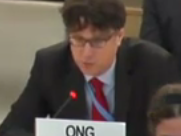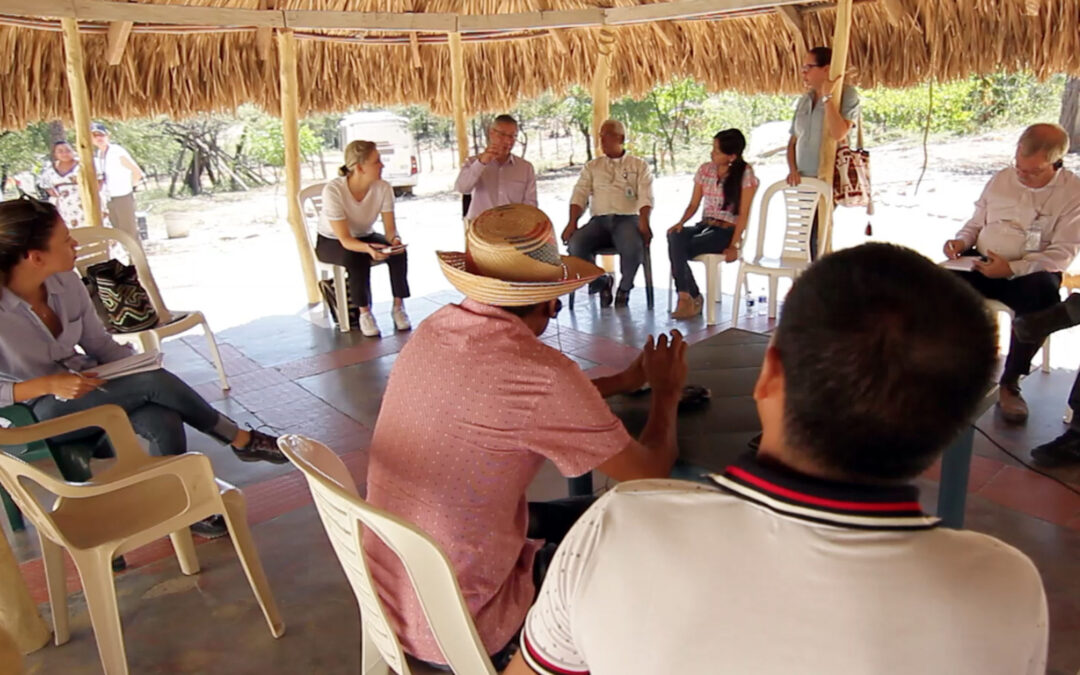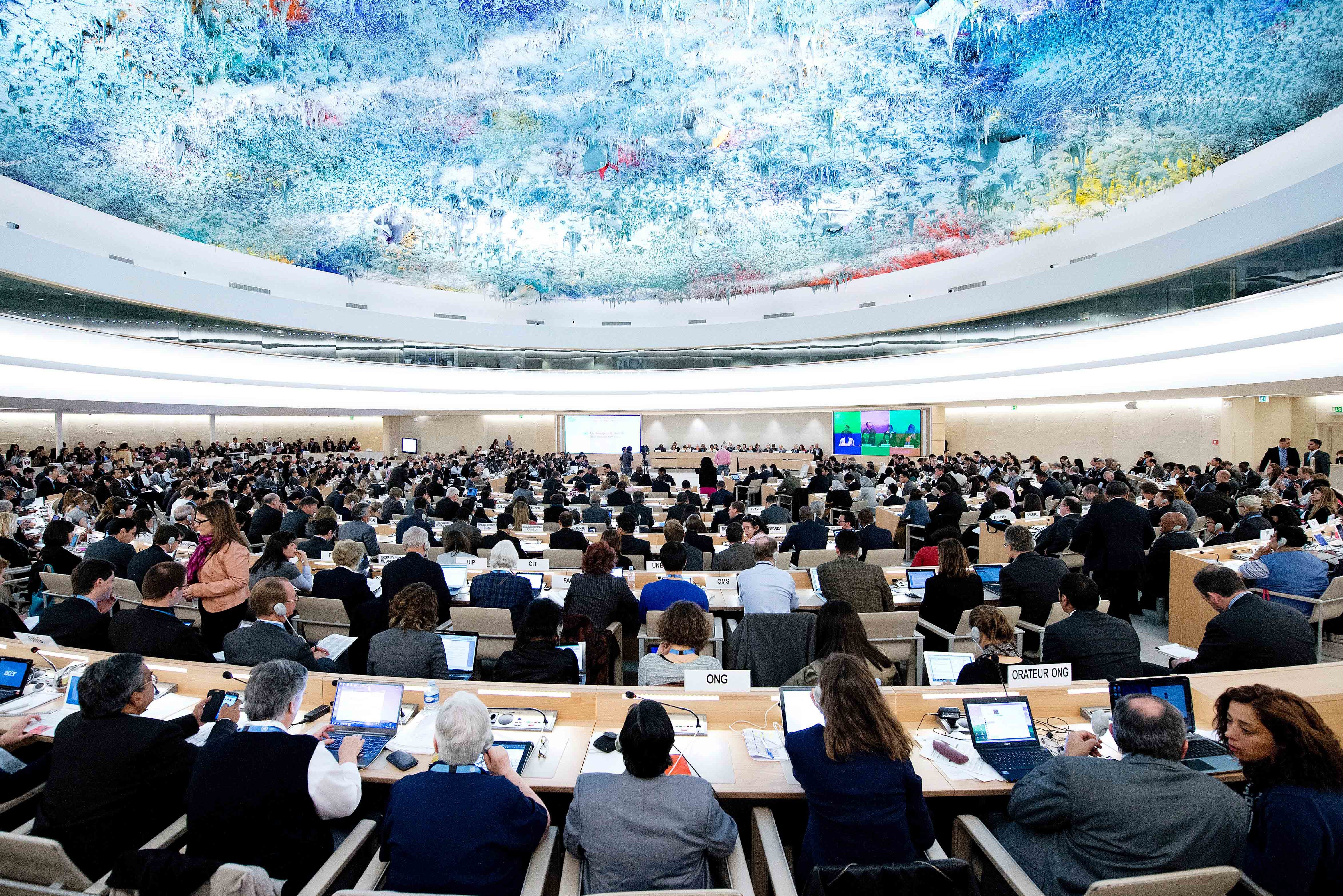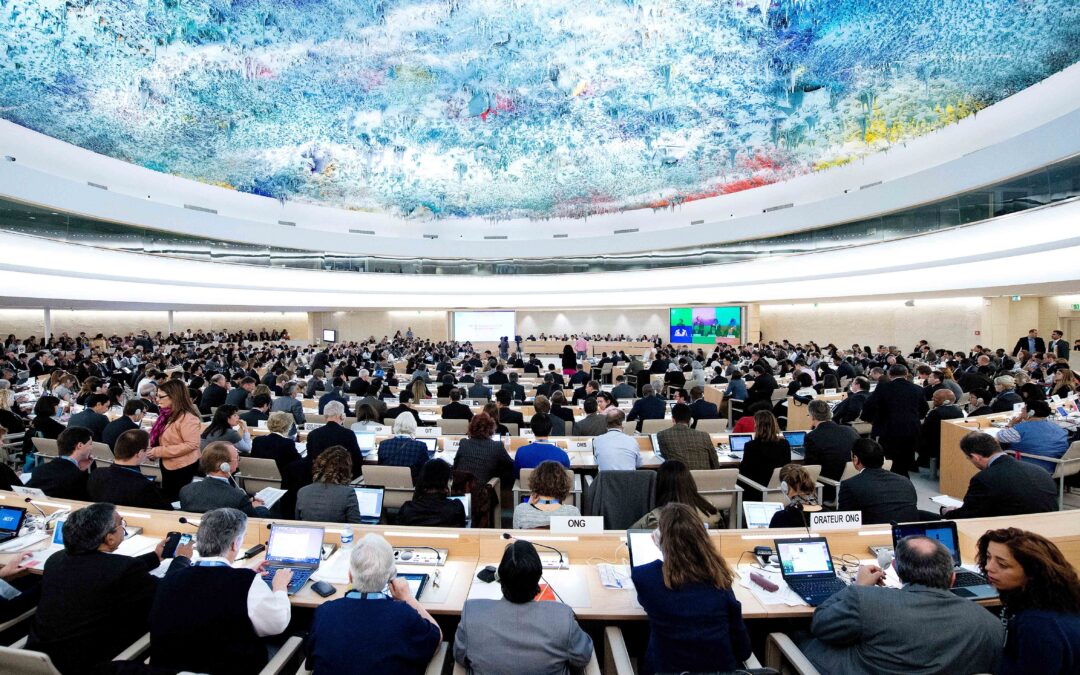
Mar 22, 2018 | Advocacy, Non-legal submissions
The ICJ today highlighted at the UN the need for further action to address impunity in Sri Lanka and in Colombia.
The statement, delivered in a general debate at the UN Human Rights Council, responded to UN reports on Sri Lanka and Colombia, and read as follows:
Sri Lanka has not made sufficient progress on its commitments and obligations as reflected in Council resolution 30/1. Among the mechanisms contemplated, only the Office on Missing Persons (OMP) is operational. The process for establishing the other mechanisms, and the extent to which their composition will be based on the broad national public consultations carried out in 2016, remains unclear. The ICJ reiterates that, in line with operative paragraph 6 of resolution 30/1, the accountability mechanism cannot be seen as credible without involvement of international judges, prosecutors and investigators.
Furthermore, despite promises to repeal the Prevention of Terrorism Act (PTA), arrests still take place. As the High Commissioner recommended, the PTA should be promptly repealed without waiting for replacement legislation. Any proposed counterterrorism law must comply with international human rights standards.
In Colombia, the ICJ shares OHCHR’s deep concern about the exclusion of non-military State agents and private individuals from the scope of mandatory application of the Integrated System of Justice, Truth, Reparations and Guarantees of Non-repetition (per paragraph 90 of the Report). Furthermore, four months of unjustified delay by the Government in accrediting the new representative of the OHCHR Office, which ended only yesterday, undermined the ability of the Office to provide adequate technical assistance to guarantee victims’ rights in the Integrated System, as provided for by the Peace Agreement.”
[Paragraph 6 of Human Rights Council resolution 30/1 provides that the Council, “Welcomes the recognition by the Government of Sri Lanka that accountability is essential to uphold the rule of law and to build confidence in the people of all communities of Sri Lanka in the justice system, notes with appreciation the proposal of the Government of Sri Lanka to establish a judicial mechanism with a special counsel to investigate allegations of violations and abuses of human rights and violations of international humanitarian law, as applicable; affirms that a credible justice process should include independent judicial and prosecutorial institutions led by individuals known for their integrity and impartiality; and also affirms in this regard the importance of participation in a Sri Lankan judicial mechanism, including the special counsel’s office, of Commonwealth and other foreign judges, defence lawyers and authorized prosecutors and investigators;”]

Dec 20, 2017 | News
From 9-13 December, a delegation from the ICJ visited the company Carbones del Cerrejón LLC (El Cerrejón) to analyse the operation and effectiveness of its grievance mechanism.
The company, owned by Glencore plc, Anglo American and BHP Billiton, is located in the department of La Guajira, Colombia. The visit took place within the framework of the ICJ’s initiative on the effectiveness of grievance mechanisms established by companies to remedy negative impacts and human rights abuses.
The ICJ appreciated the collaboration of the Institute of Studies for Development and Peace (INDEPAZ) in the organization and facilitation of the visit.
It also acknowledges and thanks the company Carbones del Cerrejón for the welcome and all the facilities provided to the mission as well as the information shared with the delegation.
The ICJ also thanks the communities of Afro-descendants, peasants and indigenous Wayuu who welcomed and spoke with it.
This statement contains preliminary views and recommendations from the delegation regarding the company’s grievance system and the context in which it operates.
Subsequently, the ICJ will prepare a full report and will use this evaluation in the context of a general evaluation and recommendations on operational level grievance mechanisms.
The objective of the mission was to learn about and analyse the operation of the grievance mechanism established by the company and to evaluate in a preliminary way its effectiveness.
Cerrejón is one of the companies in the coal mining sector that started the process of establishing grievance and / or complaint mechanisms early.
Between 2009 and 2011 it was part of five pilot projects carried out by a team of the Special Representative of the UN Secretary General on business and human rights.
Contextualize the mechanism: Coal mining in La Guajira
La Guajira – province of Colombia on the border with Venezuela – besides its natural beauty and the friendliness of its people surprises visitors by the sharp contrast it presents between the great wealth generated by the extraction of coal and the poverty prevalent among its population.
The majority percentage of the population of La Guajira is made up of indigenous Wayuu populations and Afro-descendant communities, who generally live in poverty.
There is a lack of water and of employment opportunities or economic activities that are not linked to the operations of El Cerrejón, which accentuates the apparent dependence of the regional economy on the extractive activity of coal and raises doubts and questions about sustainability of the regional economy sitting on these bases in the short, medium and long term.
The information received by the delegation of the ICJ points to corruption as one of the main factors that influence and determine the lack of better health and education services, infrastructure and economic investment in the region by the State.
Corruption is more visible among the political class. Senior officials of the regional government were or are currently being prosecuted for corruption and murder.
La Guajira has had eight different governors in five years, which is a destabilizing and paralyzing factor in a highly centralized political system of government.
In this context, although considerable efforts are made by various actors, including El Cerrejón, distrust among the population is significant.
El Cerrejón, which operates in La Guajira, is one of the largest open-pit coal mining operations in the world and has an integrated operation that includes the extraction of coal, its transport by private railroad to Puerto Bolivar (150 kilometers away) and its cargo and transportation to consumer countries.
About 40 percent of the coal exported by Colombia goes to European markets. El Cerrejón is presented as an example of responsible mining both in the Colombian coal mining region and in the world and it has recently developed a series of social responsibility policies, including a due diligence process in the field of human rights.
The ICJ was informed that the experience and lessons learned from the grievance mechanism have influenced the design of these policies.
Colombia-Cerrejon-grievance-assessment-News-2018-ENG (Full text in PDF)
Watch the video (in Spanish):

Mar 25, 2015 | Advocacy, Non-legal submissions
La Comisión Colombiana de Juristas afiliada a la Comisión Internacional de Juristas resaltan el valioso aporte de la Oficina del Alto Comisionado durante estos 18 años en Colombia.
25° período de sesiones, Consejo de Derechos Humanos de Naciones Unidas
Tema 2 de la agenda, Informe anual de la Alta Comisionada de las Naciones Unidas para los Derechos Humanos sobre la situación de derechos humanos en Colombia (A/HRC/28/3/Add.3)
Situación de derechos humanos en Colombia
25 de marzo de 2015
Señor Presidente:
La Comisión Colombiana de Juristas afiliada a la Comisión Internacional de Juristas resaltan el valioso aporte de la Oficina del Alto Comisionado durante estos 18 años en Colombia: tiene oficinas en varias regiones y trabaja con comunidades afectadas por el conflicto armado; ha contribuido “a cambios positivos a través de su observación, incidencia, declaraciones públicas, buenos oficios y cooperación técnica”; “[h]a presentado informes periódicos a entidades gubernamentales; ha actuado como garante en conflictos (…); ha interactuado a diario con el Estado y la sociedad civil para encontrar soluciones a los desafíos de derechos humanos (…); y ha contribuido al fortalecimiento de las instituciones” (párrafo 2).
Pese a ciertos avances en derechos humanos, el Informe anual resalta los retos en materia de implementación, falta de voluntad política para aceptar la responsabilidad por violaciones del pasado1, desigualdades económicas y “un acceso asimétrico a los derechos y a los servicios públicos” (párrafo 14). Además, Colombia todavía actúa en contra de sus obligaciones internacionales, como sucede con el derecho a la consulta previa (párrafo 26) o la ampliación de la justicia militar (párrafo 60). Adicionalmente, Colombia no recibe procedimientos especiales desde 2010, aunque cuenta con una invitación permanente y seis mandatos han solicitado visita2.
Después de 18 años invertidos en el país, la Oficina sigue siendo los ojos de la comunidad internacional para derechos humanos, y el acompañante o asesor del Estado en el diseño de sus políticas (párrafos 16, 29, 34, 60).
Según el Informe, el Gobierno y las FARC-EP han logrado avances sin precedentes para poner fin al conflicto armado (párrafo 6). Si “[l]a perspectiva de una salida negociada al conflicto (…) y el crecimiento económico proporcionan una oportunidad única para ampliar la presencia del Estado, hacer frente a la desigualdad y mejorar la situación de los derechos humanos” (párrafo 19), indiscutiblemente la Oficina del Alto Comisionado en Colombia es una inversión clave, y no es de corto plazo.
Gracias señor Presidente.
1 El párrafo 58 dice: “El rechazo de responsabilidades por parte de las fuerzas armadas y de sus superiores políticos perpetúa la impunidad, socava la legitimidad institucional y erosiona el estado de derecho”.
2 Colombia cuenta con una invitación permanente a los procedimientos especiales de la ONU desde el 17 de marzo de 2003. Sin embargo, desde inicios de 2012 no ha aceptado ninguna visita, aunque los mandatos sobre extrema pobreza, personas internamente desplazadas, violencia contra la mujer, afrodescendientes, mercenarios y alimentación han solicitado visitar el país.

Mar 13, 2015 | Advocacy, Non-legal submissions
The Colombian Commission of Jurists, an affiliate of the ICJ, today called for the UN Human Rights Council to uphold the use of civilian courts, rather than military tribunals, to try civilians and to adjudicate claims for human rights violations.
An oral statement to the UN Human Rights Council highlighted that:
- military tribunals should as a matter of principle have no jurisdiction to try civilians or to adjudicate claims of serious human rights violations;
- These matters should be the domain of civilian courts; and
- The jurisdiction of military tribunals should be restricted to specifically military offenses committed by military personnel.
The oral statement emphasised to the global reach of the issue, referring by way of example to the military commissions established by the United States of America at Guantánamo Bay, as well as recent negative developments in Colombia, Egypt, Thailand and Pakistan.
The statement noted that the Principles Governing the Administration of Justice Through Military Tribunals presented to the Commission on Human Rights by Emmanuel Decaux in 2006 (UN Doc E/CN.4/2006/58), are widely referenced, but have yet to receive full recognition by the Human Rights Council. The statement added its support to the calls by the Special Rapporteur on Independence of Judges and Lawyers, the Working Group on Arbitrary Detention, and others, for the Council to endorse and seek implementation of the Principles without further delay.
The statement responds to an expert consultation on the administration of justice through military tribunals convened by the Council (UN Doc A/HRC/28/32).
The full oral statement can be downloaded in pdf format here: Advocacy-HRC28-MilitaryCourts-OralStatement-2015
Said Benarbia, Director of ICJ’s Middle East North Africa Programme participated in the expert consultation.
His statement can be found here: MENA-Military Courts HRC28-Advocacy-2015-ENG (full text in PDF).
Thailand exercised its right of reply, which can be viewed in the UN webcast archive, here.








